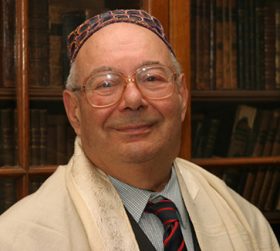An Obituary

Lionel Blue, rabbi, writer and broadcaster, was born on 6 February 1930 and died on 19 December 2016 in London.
Rabbi Lionel Blue was one of the last of a generation of liberal rabbis in Britain that included Rabbis John Rayner, Hugo Gryn and Albert H. Friedlander. They were all children of the Second World War who carried stories of loss and displacement with them. Each of them was singularly brilliant and charismatic in his own way, helping loosely affiliated Jews to find a way back to a liberal, inclusive form of Judaism. Unlike the others, Lionel Blue was not a refugee, but grew up as the son of a tailor and secretary in London’s then predominantly Jewish East End, experiencing the Blitz and the local violence of Oswald Mosley’s anti-Semitic blackshirts.
Born in 1930, Blue documented his struggles with his homosexuality as well as his path to the rabbinate in his book “Godly and Gay,” published in 1981. Blue was private, but non-secretive about his long-term partnerships and as the first rabbi in Britain to publicly declare his homosexuality, he became an important role model for gay Jews.
Not one for being set up on a pedestal, Lionel was happiest as a homebody in the companionship of a loving partner, or having a chat over some biscuits and a cup of tea with the Sisters of Zion, an order of nuns. He was equally at ease writing a cookery column for the Catholic paper “The Tablet” or teaching rabbinic students at the Leo Baeck College, where he was mentor, friend and confidante to generations of progressive rabbis and their families. Blue’s non-judgemental manner and deep humanity provided a warm shelter for many Jews in the community who felt disenfranchised or unrepresented.
Rabbi Blue’s flat was modest but full, so he rented a hall on London’s Portobello Road, one Friday a month, for a vegetarian potluck dinner. The doors were open and anyone who wandered in off the street was welcomed. His own cuisine was not about “lofty” ingredients – canned sweet corn and frozen peas were favourite staples. His kitchen was about ending loneliness, about bringing people, from every faith and from no faith, around a table to eat together.
An invitation to participate in the BBC radio 4’s religious programme “Thought for the Day” brought him to breakfast tables throughout England and he became a regular contributor to the “God slot” for decades. His national profile was bolstered by a series of popular books, which mostly dealt with food, faith, religion, or preferably all of the above. He found a particular following in Germany, where he regularly participated in Christian-Jewish-Muslim dialogue, and several of his publications were translated into German..
As he became a public figure, he also quietly wrote liturgical texts for the progressive movement, initiated self-help groups for AIDS victims and gave a voice to invisible minorities. He spoke openly, for example, of the need for the acceptance of elderly gay people in retirement homes. As the convener of the British Reform movement’s rabbinical court for seventeen years, he set a compassionate standard for dealing with nervous candidates who appeared before the court wishing to convert to Judaism, adopt a child, or obtain a Jewish divorce.
The reason that all of this apparently saintly behaviour wasn’t unbearable was because he did not take himself too seriously – his wonderful sense of humour was infectious, and his feet were on the earth. He wrote: “In praying God said to me, ‘Lionel, don’t get high ideas above yourself. Your job is very simple… to help people get out of bed in those horrid winter months and give them enough spiritual sympathy that they don’t want to dive back under their duvets again.'”
Michal Friedlander was first convinced of Lionel Blue’s exceptional people skills when, at the age five, she was delighted to discover his dog, Re’ach, lapping up water from a kitchen bowl. No one else, before or since, has ever managed to get a dog into her mother’s kitchen.
For further information about Lionel Blue’s life and his unparalleled sense of humor, listen to the obituary that the Rabbi presents of himself: http://www.bbc.co.uk/programmes/b0891fkd